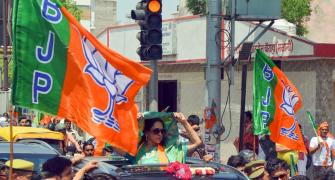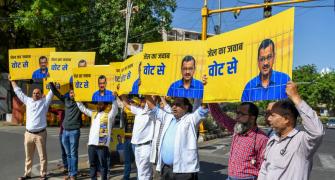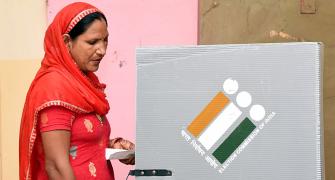Indian airlines on Wednesday filled aviation turbine fuel (ATF) into the tanks of their aircraft at Rs 68,000 a kilolitre. Around the same time, ATF sold at $1,037.8 (Rs 41,500) a kilolitre at the Singapore airport -- full 39 per cent below Indian prices.
The bottom line is clear: Higher ATF prices are largely responsible for the red ink on the books of Indian airlines. While Civil Aviation Minister Praful Patel reckons the industry will end the current financial year with losses of Rs 8,000 crore, up from Rs 4,000 crore in 2007-08, aviation consultancy Centre for Asia Pacific Aviation estimates the losses could be still higher at Rs 10,000 crore.
If the oil marketing companies price ATF at the current global prices, the airlines will be able to substantially pare their annual losses. Here's how: A saving of Rs 26,500 per kilolitre on annual consumption of 2.5 million kilolitres results in savings of Rs 6,625 crore.
"A reduction in ATF price by Rs 20,000 a kilolitre (from Rs 68,000 today) could help the airline save Rs 400 crore in its annual fuel bill, said SpiceJet CFO Partha Sarathi Basu. Full parity with international prices will help the company, which has an 11 per cent share of the market, do still better.
Analysts, however, said that such a cut in ATF prices will not mean all airlines will come out of the red. "It depends on how loss-making the airline is or how tight a ship you run. Airlines which were more or less profitable before the oil price spike can wipe out their losses,'' said an analyst.
The all-important question is, will the oil marketing companies agree to drop ATF prices? Almost 95 per cent of the market is with state-owned firms.
These companies are forced to sell diesel, petrol, kerosene and liquefied petroleum gas at way below costs. These losses they then try to recover from products which they are free to price -- ATF being the favourite.
Analysts and industry experts said the state-owned companies are unlikely to agree to cut ATF prices as there is no likelihood of an improvement in petrol and diesel prices in the near future. Inflation has hit the double-digit mark, thanks to the price rise announced recently. And as the government readies for the next general elections, it would refrain from raising these prices any further.
Still, there could be some positives for the airlines in the whole mess. Aircraft makers said that with interest rates on the rise, the market for sub-leasing of aircraft has become an attractive option.
Of the 300-odd aircraft owned by Indian airlines, at least 15 per cent, or 45 aircraft, can be leased owing to excess capacity. With current lease rentals at $350,000 per aircraft per month, this could help the airlines make $189 million (almost Rs 800 crore) over the next one year and cut their losses to that extent.
The airlines, on their part, said it would not be easy to execute such deals. "There is no standard clearing house that makes it easy for an airline to lease an aircraft to another airline which is looking for an aircraft of that specification," said Bruce Ashby, CEO of budget-carrier IndiGo.
Still others argued that the competition is tough in the space with leasing specialists like GE Commercial Aviation Services in the fray. Also, the market for leased aircraft has softened after airline bankruptcies in the US.
The other silver lining on the horizon is the improvement in the average realization per seat. In the last few months, most airlines have raised their fares. Rock-bottom fares to snatch market share from rivals could soon be a thing of the past.
The question is, will it be enough?








